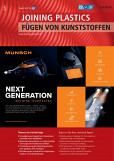Machine learning methods for inline quality assurance in heated tool welding
Authors: M. Sc. Jonathan Lambers, Dr. Christian Balzer, Dipl. Phys. Timo Grunemann, Dr. rer. nat. Thomas Hochrein, Prof. Dr.-Ing. Martin Bastian
DOI: https://doi.org/10.53192/JP202403163
In the research project FloWeld, the established process monitoring of heated tool welding, which includes force, displacement, and temperature sensors, was supplemented by a heat flux sensor that measures the heat flux from the heating element
into the adjacent plastic. With the enhanced system technology, welding trials were conducted using PP-H and PVC-U, and the shortterm welding factors of the resulting joints were determined by threepoint bending tests. Based on the process data generated during these trials, models were trained using machine learning methods, which were able to predict the short-term bending strength of the weld seam, expressed as a welding factor, with an accuracy of ± 0.03. This result suggests that machine learning methods are suitable for inline quality assurance, which can classify parts as good or bad in quasi-real-time during the welding process.
An active subscription enables you to download articles or entire issues as PDF-files. If you already are a subscriber, please login. More information about the subscription















